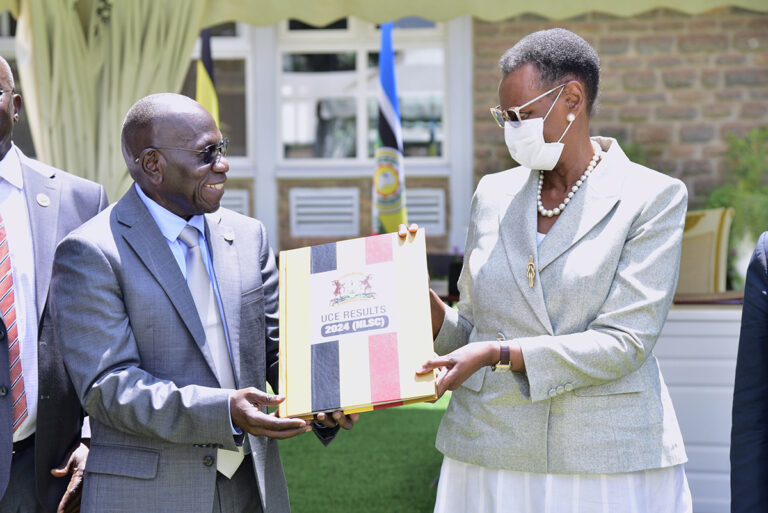The Ministry of Education has released the results for last year’s Uganda Certificate of Education (UCE) examinations, with an impressive 98.05% of students passing and qualifying for the next academic level.
According to the Uganda National Examinations Board (UNEB), 350,146 out of 359,417 candidates met the requirements to proceed, marking a strong academic performance across the country.
The results, announced by the First Lady and Minister for Education and Sports, Mrs. Janet Museveni, at State House-Nakasero, also revealed that female candidates outperformed their male counterparts in several subjects.
UNEB Executive Director Dan Nokrach Odongo highlighted that girls achieved higher scores in English Language, Christian Religious Education, and Art and Design.
However, in subjects such as History and Political Education, Geography, Mathematics, Agriculture, Chemistry, and Biology, male candidates performed better at the exceptional and outstanding levels.
A notable change in this year’s results is the implementation of the Competency-Based Curriculum (CBC), which assesses students based on skills rather than rote knowledge.
The grading system has shifted from numerical divisions to letter grades (A, B, C, D, and E), with A being the highest level of achievement.
Under this new system, students who meet the qualification criteria receive a UCE certificate, categorized as ‘Result 1.’
Those who failed to meet the requirements due to missing subjects or incomplete coursework are given ‘Result 2,’ while those who scored only at the elementary level in all subjects receive ‘Result 3’ and do not qualify for a certificate.
Students showed exceptional performance in Art and Design, where 13% scored distinctions, followed by History and Political Education (6.4%) and Agriculture (3.8%).
However, subjects such as Chemistry (1%), Christian Religious Education (1.6%), and Physics (1.9%) recorded the lowest distinction rates.
Odongo noted that many students struggled to apply knowledge to real-life problem-solving scenarios, particularly in science subjects.
Special Needs Education (SNE) students also performed well under the CBC curriculum.
Of the 743 candidates registered, 703 (95.3%) qualified for UCE certificates, demonstrating significant progress in inclusive education.
All deaf candidates qualified, a notable improvement from previous years when they faced greater challenges.
Prison candidates also excelled, with 27 of the 28 registered candidates sitting for the exams and all qualifying for UCE certificates.
Overall, the transition to the CBC curriculum has provided students with a more holistic education, equipping them with better communication skills, research abilities, and problem-solving competencies.
UNEB Chairperson Prof. Celestino Obua expressed confidence in the new system, stating that students emerging from the CBC curriculum are more prepared for future academic and professional pursuits.
However, challenges such as limited IT infrastructure, inadequate laboratory facilities, and the need for more trained examiners remain areas requiring improvement to support continued student success.

